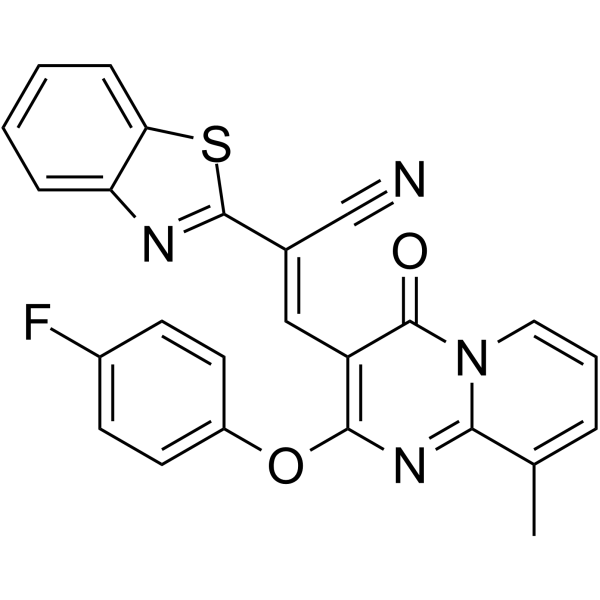
CCG-63808
CAS No. 620113-73-7
CCG-63808( —— )
Catalog No. M26641 CAS No. 620113-73-7
CCG-63808 is a reversible inhibitor of regulator of G-protein signaling (RGS) proteins.
Purity : >98% (HPLC)
 COA
COA
 Datasheet
Datasheet
 HNMR
HNMR
 HPLC
HPLC
 MSDS
MSDS
 Handing Instructions
Handing Instructions
| Size | Price / USD | Stock | Quantity |
| 2MG | 56 | Get Quote |


|
| 5MG | 87 | Get Quote |


|
| 10MG | 146 | Get Quote |


|
| 100MG | Get Quote | Get Quote |


|
| 200MG | Get Quote | Get Quote |


|
| 500MG | Get Quote | Get Quote |


|
| 1G | Get Quote | Get Quote |


|
Biological Information
-
Product NameCCG-63808
-
NoteResearch use only, not for human use.
-
Brief DescriptionCCG-63808 is a reversible inhibitor of regulator of G-protein signaling (RGS) proteins.
-
DescriptionCCG-63808 is a reversible inhibitor of regulator of G-protein signaling (RGS) proteins. CCG-63808 dose-dependently inhibits the TR-FRET signal between RGS4-AF488 and Tb-Gαo with IC50 values of 1.9 μM.(In Vitro):CCG-63808 showed selectivity among RGS proteins with a potency order of RGS 4 > 19 = 16 > 8 7. CCG-63808 inhibited the GTPase accelerating protein activity of RGS4.
-
In Vitro——
-
In Vivo——
-
Synonyms——
-
PathwayOthers
-
TargetOther Targets
-
Recptormelanocortin 3 (MC3)| melanocortin-1 receptor
-
Research Area——
-
Indication——
Chemical Information
-
CAS Number620113-73-7
-
Formula Weight454.48
-
Molecular FormulaC25H15FN4O2S
-
Purity>98% (HPLC)
-
SolubilityIn Vitro:?DMSO : 1 mg/mL (2.20 mM)
-
SMILESCc1cccn2c1nc(Oc1ccc(F)cc1)c(\C=C(/C#N)c1nc3ccccc3s1)c2=O
-
Chemical Name——
Shipping & Storage Information
-
Storage(-20℃)
-
ShippingWith Ice Pack
-
Stability≥ 2 years
Reference



-
N-Formyl-L-methionin...
Effective in the initiation of protein synthesis. The initiating methionine residue enters the ribosome as N-formyl methionyl tRNA. This process occurs in Escherichia coli and other bacteria as well as in the mitochondria of eukaryotic cells.
-
4,5-Dimethoxycanthin...
4,5-Dimethoxycanthin-6-one is an alkaloid isolated from Picrasma quassioides BENNET (Simaroubaceae).4,5-Dimethoxycanthin-6-one was isolated from Picrasma quassioides BENNET (Simaroubaceae) with antimicrobial activity.4,5-Dimethoxycanthin-6-one was isolated from Picrasma quassioides BENNET (Simaroubaceae) with antimicrobial activity.
-
3-Hydroxycinnamic ac...
3-Hydroxycinnamic acid is a natual product isolated from Cinnamomum cassia Presl?.?3-Hydroxycinnamic acid has antioxidant activity.



 Cart
Cart
 sales@molnova.com
sales@molnova.com


